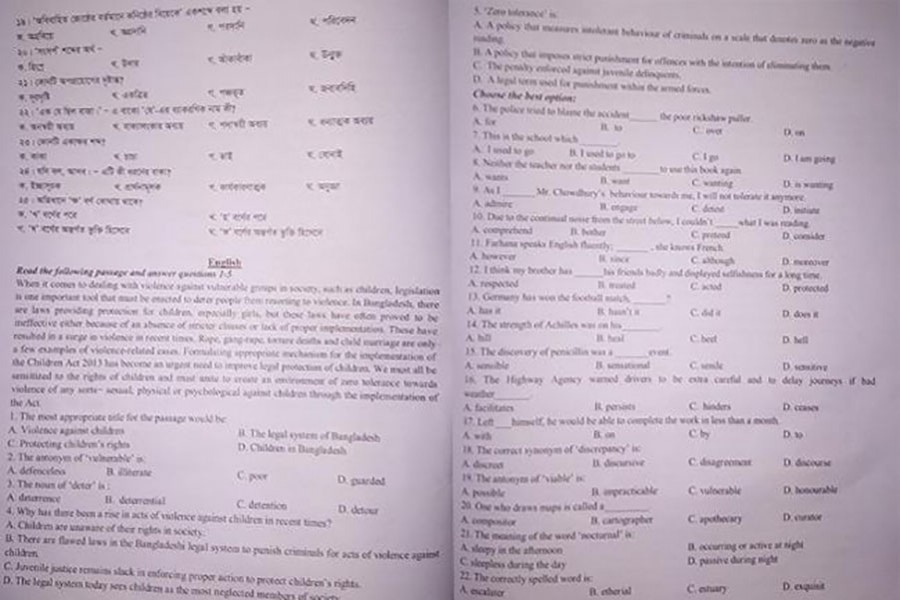The way he protests a misdeed is unique, indeed. On hunger strike right at the foot of the Raju Smarak Bhaskarja, a student from the Law Department of the University of Dhaka has brought into sharp contrast the ambivalence of the authorities. First, the DU authorities admitted that question paper of the 'Gha' unit was digitally forged for leaking. Law enforcement agencies even arrested six members of the gang for the leak. This initially compelled the university authorities to postpone publication of results.
When candidates, their parents or guardians and others were keeping their fingers crossed, the authorities announced the publication of results. The leak of question paper and its bearing on results were totally ignored. Why? If digitally leaked, many candidates are supposed to have access to the question papers before sitting for the test. If the leaked question paper was available a few hours before the commencement of the test, even the most unlikely candidate could score enough marks for qualifying for admission to the most sought-after departments. It seems a few have done even better. A Bangla contemporary reports that the one who emerged first in the latest admission test actually failed in the test of 'Ga' unit which is meant for students of science group. Not only has he scored full marks in Bangla, he has also scored more than 27 out of 30; where in the test under the 'Ga' unit his marks were just one-third. Yet another failed candidate in the earlier test also found her place at the top of the successful candidates' list. This speaks volume for the undesirable benefit some candidates received courtesy of question leak.
Now the questions are, how many of the candidates had the clandestine access to the leaked question papers and how many hours before? All these troubling questions have not deterred the authorities from going ahead with publication of the results of the admission test. What prompted the authorities to do so is quite intriguing. They contend that it was not before 40 minutes or so. If the premier university of the country treat the question paper leak so lightly, it shows other considerations were high on the agenda. Unless insiders are involved, this cannot happen.
Here the other considerations are no light issues either. For example, holding the test once again involves a lot of logistic paraphernalia along with time and energy. The authorities have shown their reluctance to do the extra exercise for the sake of maintaining its record straight. Question paper leaks have been endemic for quite sometime now. The education minister threatens punitive measures against those spreading rumours of question leaks. Instead of unleashing wrath on rumourmongers, he would do better if he went for a foolproof measure against question leaks.
The malpractice was at its worst when it became so rife as to pollute examinations at the primary school level by initiating students of class II and III to it. No mechanism proved good enough to maintain the sanctity of examinations. But then most of the question papers of the Secondary School Certificate Examinations (SSC) and Higher Secondary Certificate (HSC) examinations held last time escaped the indignity on account of a new system of selection of a set from several sets of question papers only minutes before the start of the examination.
Admission test is a different proposition. Only one set of question paper is there for each unit in universities like the DU. The Bangladesh University Engineering and Technology (BUET), takes test on just one set of question paper and so far there is no complaint that any of its question papers has ever been leaked. The DU should have maintained a similar record. But it has not. Allegations of question leaks have slurred its reputation almost every year. Yet the tradition of ignoring proven leaks of question papers continues and apart from taking some punitive measures at the individual beneficiary level, nothing much had been done to eliminate the bane.
That the DU cannot stop leaks of question papers does not speak of its efficiency and technological savvy. Now if it turns a blind eye to the damage done to the system of selection of candidates, the wilful move towards a blatant compromise will put it in a bad light. The student who has gone on hunger strike has tried to bring the authorities' attention to this vital moral stand point. Even a university can err on maintaining the confidentiality but once it compromises on moral principles of upholding justice to merit, the edifice of trust and virtue crumbles.
Not only do the results of a particular unit but those of all other units thus become suspect. If this continues to happen, it can prove highly costly for not only the university concerned but also for the nation. Universities act not only as the repository of knowledge, they must build on what is already in store. At the same time the highest seats of learning should champion the values and principles so much so that scholars can pursue knowledge in an enlightened atmosphere. But if at the start of their life at the university they know some among them got the opportunity in an unfair manner, psychology is bound to suffer collateral damages.
An image matters not only for an individual but also for an institution and a nation. The DU built its high profile bit by bit over the decades. But lately, it cannot claim to have added much to what were its prized possessions. The BUET produces engineers in various disciplines and they receive favourable reckoning because of the standard maintained. The DU has the added responsibility of inculcating qualities in students so essentials for leading the nation in the future. If the authorities become lax on moral standard, it will send a wrong message. In fact the rot has started long before. Now is the time to stem it for a turnaround.


